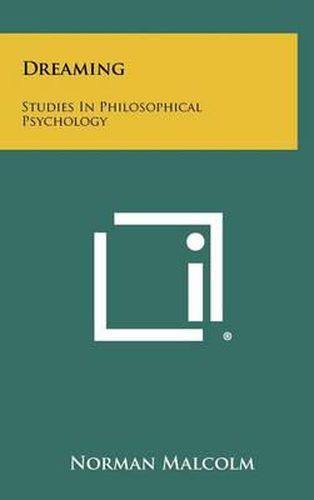Readings Newsletter
Become a Readings Member to make your shopping experience even easier.
Sign in or sign up for free!
You’re not far away from qualifying for FREE standard shipping within Australia
You’ve qualified for FREE standard shipping within Australia
The cart is loading…






Dreaming: Studies In Philosophical Psychology is a book written by Norman Malcolm that explores the nature of dreams and their significance in the field of philosophy and psychology. The book is divided into three parts, each of which delves into a different aspect of dreaming.The first part of the book discusses the nature of dreams and the different theories that have been proposed to explain them. Malcolm examines the idea that dreams are simply random and meaningless, as well as the Freudian theory that dreams are a manifestation of repressed desires and conflicts. He also considers the possibility that dreams have a deeper meaning and can provide insight into our unconscious thoughts and emotions.The second part of Dreaming: Studies In Philosophical Psychology focuses on the philosophical implications of dreaming. Malcolm explores the question of whether dreams can be considered a form of knowledge, and whether they can provide evidence for the existence of a higher reality beyond our waking experience.The final part of the book examines the relationship between dreaming and the self. Malcolm considers the idea that dreams can provide a window into our true selves, and that they can reveal aspects of our personality and character that are hidden from our conscious awareness.Overall, Dreaming: Studies In Philosophical Psychology is a thought-provoking and insightful exploration of the nature of dreams and their significance in the fields of philosophy and psychology. It is a must-read for anyone interested in the mysteries of the human mind and the nature of consciousness.This scarce antiquarian book is a facsimile reprint of the old original and may contain some imperfections such as library marks and notations. Because we believe this work is culturally important, we have made it available as part of our commitment for protecting, preserving, and promoting the world's literature in affordable, high quality, modern editions, that are true to their original work.
$9.00 standard shipping within Australia
FREE standard shipping within Australia for orders over $100.00
Express & International shipping calculated at checkout
Dreaming: Studies In Philosophical Psychology is a book written by Norman Malcolm that explores the nature of dreams and their significance in the field of philosophy and psychology. The book is divided into three parts, each of which delves into a different aspect of dreaming.The first part of the book discusses the nature of dreams and the different theories that have been proposed to explain them. Malcolm examines the idea that dreams are simply random and meaningless, as well as the Freudian theory that dreams are a manifestation of repressed desires and conflicts. He also considers the possibility that dreams have a deeper meaning and can provide insight into our unconscious thoughts and emotions.The second part of Dreaming: Studies In Philosophical Psychology focuses on the philosophical implications of dreaming. Malcolm explores the question of whether dreams can be considered a form of knowledge, and whether they can provide evidence for the existence of a higher reality beyond our waking experience.The final part of the book examines the relationship between dreaming and the self. Malcolm considers the idea that dreams can provide a window into our true selves, and that they can reveal aspects of our personality and character that are hidden from our conscious awareness.Overall, Dreaming: Studies In Philosophical Psychology is a thought-provoking and insightful exploration of the nature of dreams and their significance in the fields of philosophy and psychology. It is a must-read for anyone interested in the mysteries of the human mind and the nature of consciousness.This scarce antiquarian book is a facsimile reprint of the old original and may contain some imperfections such as library marks and notations. Because we believe this work is culturally important, we have made it available as part of our commitment for protecting, preserving, and promoting the world's literature in affordable, high quality, modern editions, that are true to their original work.